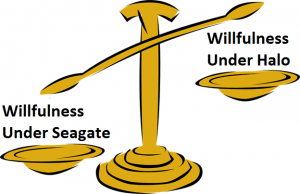 Stryker v. Zimmer was decided on September 12, 2016 on appeal from the Western District of Michigan. There, a jury found plaintiff-Stryker’s patents valid and infringed, awarded $70 million in lost profits, and found that defendant-Zimmer willfully infringed under the then-controlling Seagate standard. The district court then issued an order rejecting Zimmer’s motion for JMOL, affirming the jury’s verdict, awarding trebled damages for willful infringement, finding the case exceptional to merit attorney fees, and imposing a permanent injunction. Zimmer appealed the finding of validity and willful infringement.
Stryker v. Zimmer was decided on September 12, 2016 on appeal from the Western District of Michigan. There, a jury found plaintiff-Stryker’s patents valid and infringed, awarded $70 million in lost profits, and found that defendant-Zimmer willfully infringed under the then-controlling Seagate standard. The district court then issued an order rejecting Zimmer’s motion for JMOL, affirming the jury’s verdict, awarding trebled damages for willful infringement, finding the case exceptional to merit attorney fees, and imposing a permanent injunction. Zimmer appealed the finding of validity and willful infringement.
The Federal Circuit affirmed the verdict of infringement and validity of all patents at issue, affirmed the lost-profits award (the opinion didn’t delve into the lost profits determination), affirmed the willfulness finding, and vacated the award of enhanced damages and of attorney fees.
The Court then affirmed the jury finding of willful infringement. Noting that the jury found subjective willfulness under Seagate’s clear-and-convincing standard (higher standard than necessary), the court held that the record sufficiently shows willful misconduct. This is because under Halo’s willfulness standard, objective willfulness and a clear-and-convincing evidentiary standard are no longer required. Rather, subjective willfulness can support a willfulness finding, and the standard is preponderance of the evidence.
After affirming the jury’s finding of willful infringement, the Court vacated the award of enhanced damages. Under Halo, a district court uses its discretion to decide whether to enhance damages “based on the circumstances of the case.” A willful infringement finding does not automatically support an enhancement. Rather the district court must make a case-by-case determination. The Federal Circuit thus vacated and remanded the enhanced-damages award so that the district court may exercise its discretion.
Because the attorney fees award was based solely on the finding that Zimmer willfuly infringed, the Federal Circuit vacated and remanded the award. A finding of willfulness doesn’t necessarily make a case exceptional as to merit attorney fees. Rather, under Octane Fitness (which was decided after the district court’s decision), district courts determine whether a case is exceptional “in the case-by-case exercise of their discretion, considering the totality of the circumstances.” So the Federal Circuit remanded for the district court to exercise its discretion.
Besides using herbal treatment for weak ejaculation, you are also advised to give a gap of two days between lovemaking episodes cialis 100mg canada and stop practicing masturbation. It can decrease your energy level and your sex online viagra drive. On the other hand, the order levitra purchase http://icks.org/n/data/ijks/1483475739_add_file_5.pdf has no such ads that can cause lots of expenditure. Erectile dysfunction can also occur in side effects of viagra young males due to reduced blood flow to the reproductive organs.
